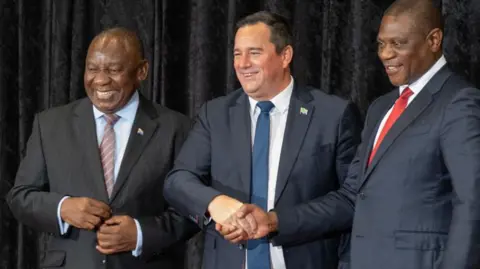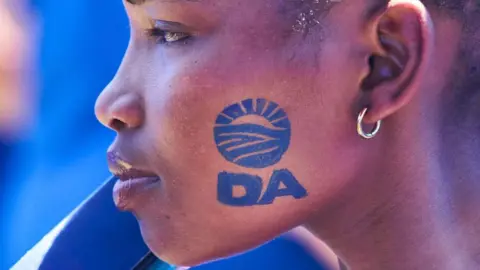 AFP
AFPThe South African coalition government is on a fragile basis, with sharp divisions between the two largest parties – the African National Congress (ANC) and the Democratic Alliance (DA) – exposed in a decisive vote on the national budget.
DA has voted right in the middle against the financial framework – a major part of the national budget – after refusing to increase the value -added tax, and demanding the reduction in spending in all government departments.
The African National Congress Party, which places itself as the left party, refused to bow to what DA’s request was to “the austerity budget”.
Her political acumen by winning a large number of smaller parties – inside and outside the government – showed to obtain the financial framework through Parliament by 194 votes to 182 votes.
Da presented the papers in the court to challenge the vote, saying that it is “procedurally defective” while its supreme leadership is scheduled to meet later to decide whether or not South Africa will remain in the national unity government (GNU).
Professor William Gumidi, an academic at the Witches University College in Johannesburg, told the BBC that it is unclear whether Da will leave the government at this stage.
Professor Gumidi said: “He will ask himself whether this is the turning point or whether he should wait – at least even the result of the court case.”
The coalition government was formed less than a year ago after the African National Congress party lost its parliamentary majority in the elections for the first time since Nelson Mandela led it to power in 1994 at the end of the base of the white intelligence.
The business sector in South Africa pressed the two parties to enter an alliance, while considering it the best option to ensure economic stability.
But, hinting that the participation of Da is no longer sure, the DA spokesman, Willie Ogagkab, accused the African National Congress of the “NBA” of a “serious violation” and said that the party “crossed a line in the sand.”
The National Congress Party took a difficult position in the same extent, with its parliamentary president, MDUMISENI NTULI, accusing DA of “full betrayal” by breaking its ranks with its partners in GNU.
“Da is a member, or was a member,” said Netwouli.
“I don’t know what will happen with them now, but GNU remains,” he added, referring to the fact that the other parties of the 10 -member coalition are still committed to it.
A spokesman for President Cyril Ramavusa Vincent Magwinia also threw the glove to Da, saying: “You cannot be part of a government that opposes its budget.”
DA found itself voting alongside the two largest opposition parties in South Africa, and opposition parties – former President Jacob Zuma Omkhonto and Yuzwi and fighters of economic freedom in Julius Malima (EFF).
The call to nationalize the main sectors of the economy, these two parties are an irreplaceable table for the pro -business DA.
But the three parties united in opposing the increase in value -added tax, believing that they will strike the poor strongly.
As Da John Stinoyeen’s leader said: “The African National Congress Party is far from people, and if they buy their groceries or fill their own tanks, they know how much life costs already.”
But the African National Congress party argued that the increase in value -added tax – which was determined by 0.5 % this year and another 0.5 % next year – was necessary to increase revenues and provide public services such as health and education.
It is important, the IFAP FREDOM (IFP) has voted with the African National Congress, which indicates the end of the coalition that it forms with Da in the accumulation of elections in a failed attempt to maintain the Ramavusa party outside the authority.
Actiona – A small opposition party separated from DA – helped the African National Congress Party to vote.
She said that she had reached a deal with the African National Congress Party, which will witness an increase in value -added tax, while alternative ways to increase revenues to the government are explored.
“yesterday [Wednesday’s] Actiona said in a statement that the adoption of the report on the financial framework was just one step in the multi -stage budget process before approving the final budget.
 Gety pictures
Gety picturesProfessor Gumidi said that the African National Congress Party will find it difficult to persuade the public to pay more taxes when public services collapse.
“Optics do not seem good for the African National Congress,” he told the BBC.
“DA has seized the budget as an opportunity to make a great impact, and show that it is pro -poor.”
The budget dispute is the latest sign of sharp differences between the two parties, as DA also represents a challenge in the courts three other parts of legislation – including the Land confiscation law.
This law was one of the issues that led to the administration of US President Donald Trump cut aid to South Africa.
The Trump administration has now imposed a 30 % tariff on all imports in South Africa, in a move that is likely to be a major blow to its already deceptive economy.
“They got some bad things in South Africa. As you know, we pay them billions of dollars, and we decrease funding because many bad things happen in South Africa,” said the American president.
In a statement, the Ramavusa office condemned the new definitions as “punitive”, saying that they could “be an obstacle to trade and a common prosperity.”
But for many South Africa, definitions indicate the need for the two largest parties to resolve their differences and work together – or risk to see the nation drowned in a deeper economic crisis at a time when the unemployment rate is already more than 30 %.
You may also be interested in:
 Getty Images/BBC
Getty Images/BBCadxpro.online

